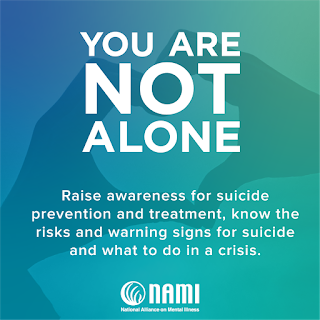As National Recovery Month moves along, we would like to draw your attention to another crucial topic, suicide. The month of September is Recovery Month and Suicide Prevention Awareness Month. The National Alliance on Mental Illness (NAMI) writes:
“September is National Suicide Prevention Awareness Month—a time to share resources and stories in an effort to shed light on this highly taboo and stigmatized topic. We use this month to reach out to those affected by suicide, raise awareness, and connect individuals with suicidal ideation to treatment services. It is also important to ensure that individuals, friends, and families have access to the resources they need to discuss suicide prevention.”
It makes sense that these significant annual observances occur at the same time. Both mental health and substance use disorders are known to play a role in suicides. NAMI shares that nearly half of individuals who commit suicide had a diagnosed mental health disorder; and, more than one in three are under the influence of alcohol.
Untreated mental illnesses like depression and bipolar disorder are associated with the practice of self-medication. That is, using drugs and alcohol to cope with uncomfortable feelings or emotions. The symptoms of mental health disorders can be taxing and lead individuals to search for relief.
Self-medicating may provide a person some comfort initially, but the benefits are diminishing. Over time, one finds that drugs and alcohol are making their symptoms more pronounced. A vicious cycle begins that ends in despair. One uses to feel better, and the mind-altering substance makes one feel worse.
Without some form of intervention, a person struggling with mental and behavioral health conditions is at a higher risk of experiencing suicidal ideations. With that in mind, it’s vital to spread the message that suicide is preventable, treatment works, and recovery is possible.
Suicide Prevention Awareness Month
Many of our readers are sure to know this is Suicide Prevention Week, September 6-12, 2020. Yesterday was World Suicide Prevention Day; some may have lit a candle in observance of the event. If not, that’s okay, because there is ample opportunity to help spread awareness about suicide prevention.
COVID-19 has led to a rise in people experiencing symptoms of mental illness. It’s critical to let those who are struggling know that they are not alone. You may be close to someone who is having a challenging time of late. If so, please reach out to them regularly to check in on them; an unexpected phone call can make an enormous difference.
You, too, may be dealing with depression, anxiety, or suicidal ideations. Please safeguard your well-being by asking for help; there are many resources available. NAMI recommends:
- If you or someone you know is in an emergency, call 911 immediately.
- If you are in crisis or are experiencing difficult or suicidal thoughts, call the National Suicide Hotline at 1-800-273 TALK (8255)
- If you’re uncomfortable talking on the phone, you can also text NAMI to 741-741 to be connected to a free, trained crisis counselor on the Crisis Text Line.
Each Mind Matters
Those who are managing despite the pandemic can do a significant service by sharing their story of hope or images and infographics about suicide. You can use #SuicidePrevention or #StigmaFree in your social media posts. Spreading valuable information helps erode the stigma of mental illness, which encourages people to seek help.
National organizations like NAMI and state initiatives like California’s Mental Health Movement Each Mind Matters are here to help. The latter, a part of the California Mental Health Services Authority, “was created to unite all of us who share a vision of improved mental health and equality.” During Suicide Prevention Awareness Month, Each Mind Matters is guiding thousands of organizations across the state on how to help:
“This year, in support of National Suicide Prevention Awareness Week, World Suicide Prevention Day, and National Recovery Month, all held in September, we are encouraging a special focus on the intersection between suicide prevention, alcohol, and drug use and efforts that foster resilience and recovery.”
You can learn more about Each Mind Matters in the video below:
If you are having trouble watching, please click here.
Addiction and Co-Occurring Disorder Treatment
If you are struggling with addiction and co-occurring mental health disorders, Hope By The Sea can assist you or your family member. Our highly trained staff can help you begin a remarkable and fulfilling journey of recovery. Please contact us today to learn more about our programs and services. Hope Starts Here!



